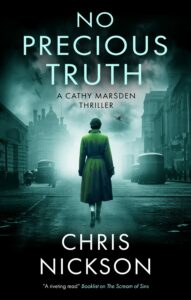Cathy Marsden #1
Often when I read a book set during WWII, I imagine myself as the heroine of an exciting yet dangerous espionage operation, looking Hollywood glamorous the whole time. Nickson offers readers a different, more workaday take in the person of Cathy Marsden, seconded from the Leeds police department to serve in the SIB or Special Operations Bureau, part of the military police. As the book opens, Cathy’s unit is joined by her brother Dan, who at the moment is stationed in London in the XX Committee, a part of MI5 which attempted to turn German spies in England into counter agents who would feed selected disinformation back to their masters.
As part of such a sensitive operation, there’s plenty Dan cannot share with Cathy’s unit, but what he does reveal is that he believes there’s an escaped spy at large in Leeds. The man, Henry Minuit, had been such a smooth operator that he was able to hoodwink the Brits interviewing him, and catching him quickly before he causes catastrophic damage is now a top priority. As a native of Leeds, Dan has been chosen for this operation, his familiarity with the town seen as improving the odds of discovering the elusive Minuit.
The SIB unit in Leeds is made up of former police, like Cathy, and they behave very much like police, though their tactics are harsher. Their interrogation methods are more thorough, with the consequences of being discovered a traitor during wartime being death. The squad is operating on a razor’s edge, with a lot of pressure and only minimal apparent help from Dan.
The book is made memorable both by Cathy’s ordinariness, as she worries about food and other things going “on the ration,” and lives with her parents, frequently spending nights with them in their backyard air raid shelter. She dresses comfortably, not fashionably, and because she was a beat cop, she also knows Leeds like the back of her hand.
It’s also memorable because the enigmatic Dan and the phlegmatic Cathy are not entirely comfortable with one another at first. They learn through the book to work together and to reach an understanding, a process which feels real rather than overtly dramatic. Their parents are delighted to have Dan home, though he’s rarely there and his absences inspire their mother, a born worrier, to fret.
This book also illustrates the low level panic most women operated under during the war as they contemplated the fate of husbands, sweethearts, brothers and sons. Not only did most not know the answer, they also didn’t know how safe their loved ones were. Communication was by letter and not always reliable, but always slow, making the current status of their loved ones maddeningly opaque.
I have read many, many books set during the war and this book dwells more on the day to day aspects of war than many others. Rather than the typical London, it’s set in Leeds, a place not really blitzed but uncomfortably bombed all the same. I liked all this wartime detail, like Cathy’s weekly service as an air raid warden.
The tale meanders a bit as the search for Henry Minuit intensifies, and I wish the narrative had gained a more velocity as it neared the finish line However, I liked the book for its different take on the war, one I think that showed more what it was like for the average Brit, as well as the introduction of Cathy, a wonderful character I was pleased to meet. — Robin Agnew
